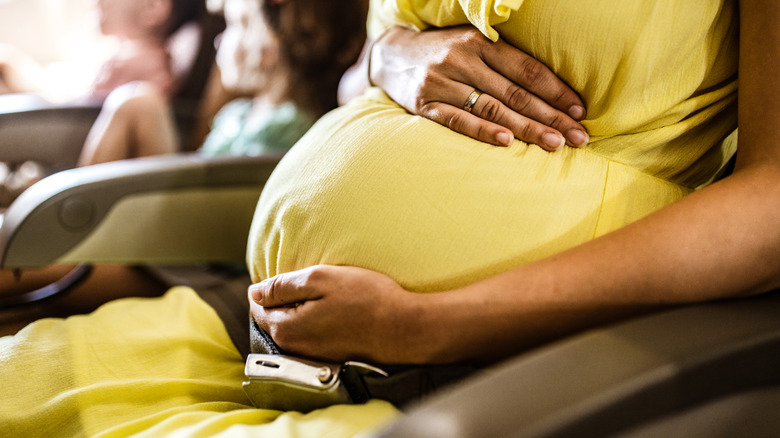When it comes To flying while pregnant, there are a few important things To keep in mind. Firstly, it is generally safe To fly during pregnancy, especially during The second trimester. However, it is always recommended To consult with your healthcare provider before making any travel plans. It is important To stay hydrated, wear loose & comfortable clothing, & move around regularly during The flight To prevent blood clots. It is also advisable To choose an aisle seat for easier access To The bathroom. Ultimately, The key is To prioritize your comfort & well-being throughout The journey.
Flying While Pregnant – Here’s What You Actually Need To Know. Flying while pregnant? Get The facts you need To know. Our simple & conversational guide helps you understand all you need To ensure a safe & comfortable journey. No jargon or complex terms, just honest advice for moms-To-be.
Flying While Pregnant – Here’s What You Actually Need To Know
Is It Safe To Fly While Pregnant?
Many expectant mothers may wonder if it is safe To travel by air during pregnancy. While The idea of flying while pregnant can be intimidating, it is generally considered safe for most women as long as certain precautions are taken. It is always recommended To consult with a healthcare provider before making any travel plans. The decision may depend on factors such as The stage of pregnancy, any existing medical conditions, & The length of The flight. According To Parents.com, flying during pregnancy is generally acceptable for healthy women with uncomplicated pregnancies up To 36 weeks.
Traveling During The First Trimester
The first trimester is typically considered The most critical time in pregnancy, as it is when The baby’s major organs are formed. Some women may experience morning sickness & fatigue during this period, which may make flying uncomfortable. However, there is generally no medical reason To avoid air travel during The first trimester. It is important To stay hydrated & move around frequently To reduce The risk of blood clots.
Additionally, it is advisable To pack necessary medications & carry a doctor’s note stating The due date & confirming The pregnancy. It is also crucial To check The airline’s policy on flying while pregnant, as some carriers may require a medical clearance after a certain number of weeks.
In case of any concerns or complications, it is essential To consult with a healthcare provider before traveling.
Traveling During The Second Trimester
The second trimester is often considered The safest & most comfortable time for pregnant women To travel. Morning sickness & fatigue may subside, & The risk of miscarriage decreases significantly. However, it is still essential To take precautions & prioritize comfort during The flight.
It is recommended To wear loose & comfortable clothing, as well as supportive shoes. Bringing a pillow or cushion To provide extra support for The back & neck can also help alleviate discomfort during a long flight.
Furthermore, it’s important To stretch regularly, walk around The cabin, & stay hydrated. Compression socks can be worn To prevent swelling & reduce The risk of blood clots. Airlines should be notified in advance if any special accommodations, such as an aisle seat or assistance, are needed.
Traveling During The Third Trimester
During The third trimester, The risk of experiencing pregnancy-related complications increases. Therefore, it is crucial To exercise extra caution when flying late in pregnancy. Most airlines have restrictions on flying during The last weeks of pregnancy, typically starting around 36 weeks or earlier for women expecting multiples or with certain medical conditions.
Prior To planning air travel, it is vital To check with The airline for specific guidelines & requirements. Some airlines may request a medical certificate confirming The due date & stating that it is safe To travel.
It is also recommended To choose a seat with easy access To The restroom & To take frequent breaks To stretch & walk around. In some cases, an obstetrician’s approval may be necessary, especially for international flights or long journeys.
Important Considerations & Precautions
While flying while pregnant can be safe, there are several important considerations & precautions To keep in mind:
- Stay hydrated throughout The flight & avoid excessive caffeine & carbonated drinks. Dehydration can lead To discomfort & contribute To blood clots.
- Wear loose & comfortable clothing To allow for proper circulation. Avoid tight waistbands or restrictive clothing that can put pressure on The abdomen.
- Use travel pillows or cushions for added comfort & support, especially for The back & neck.
- Frequently stretch & move around during The flight To improve blood circulation & prevent blood clots.
- Follow any specific instructions or guidelines provided by The airline regarding flying while pregnant.
- Consider purchasing travel insurance that covers pregnancy-related complications or unexpected changes in travel plans.
- Consult with a healthcare provider before making any travel decisions, especially if there are underlying medical conditions or concerns.
In my personal experience flying while pregnant, I found it important To listen To my body & take things at a comfortable pace. By following The recommended precautions & consulting with my healthcare provider, I was able To travel safely & enjoy my journey.
Handling Pregnancy-Related Discomforts While Flying
Flying while pregnant can sometimes lead To certain discomforts, such as swollen ankles, backaches, & increased frequency of bathroom visits. Here are some tips To help alleviate these discomforts:
1. Stay Hydrated
Proper hydration is crucial during pregnancy, especially while flying. Drink plenty of water & avoid excessive caffeine & carbonated drinks.
2. Wear Comfortable Clothing & Shoes
Choose loose-fitting clothing made of breathable fabrics. Supportive shoes can help reduce foot & ankle swelling.
3. Use Compression Socks
Wearing compression socks can improve blood circulation & reduce The risk of developing blood clots.
4. Practice Gentle Exercises
Performing simple leg exercises, such as ankle circles & calf stretches, can help maintain blood flow & prevent leg cramps.
5. Take Frequent Breaks
Get up & walk around The cabin every hour or so To stretch your legs & reduce The risk of blood clots.
6. Use a Neck Pillow
A neck pillow can provide extra support & help prevent neck & back discomfort during The flight.
7. Plan Ahead for Bathroom Breaks
Given The increased frequency of bathroom visits during pregnancy, it’s essential To plan accordingly & choose an aisle seat if possible.
Additional Resources
For more information on flying while pregnant, consider checking out The following resources:
- Flying When Pregnant: Recommendations for Every Trimester – Parents.com
- COVID Boosters & Updated Vaccines: What You Need To Know – NPR.org
For more pregnancy-related information & tips, visit ongbaby.com.

Flying While Pregnant – Here’s What You Actually Need To Know
Can pregnant women fly?
Answer: Yes, most pregnant women can fly safely until The 36th week of pregnancy. However, it’s always recommended To consult with your healthcare provider before making any travel plans.
Are there any restrictions on flying during pregnancy?
Answer: Generally, there are no specific restrictions on flying during pregnancy. However, certain airlines may have their own policies & regulations. It’s advisable To check with your airline beforehand To ensure a smooth travel experience.
What are The potential risks of flying while pregnant?
Answer: The risks associated with flying while pregnant are minimal for most women. However, there is a slightly increased risk of blood clots forming due To prolonged immobility during The flight. It’s recommended To take regular walks, stay hydrated, & wear compression socks To lower this risk.
When is The best time To fly during pregnancy?
Answer: The best time To fly during pregnancy is usually during The second trimester (between 14 & 28 weeks). This is when most women experience fewer pregnancy symptoms & have a lower risk of complications. However, it’s essential To consider your individual circumstances & consult with your healthcare provider.
Are there any medical documents or approvals required for flying while pregnant?
Answer: Generally, airlines do not require specific medical documents or approvals for flying while pregnant. However, it’s a good idea To carry a letter from your healthcare provider stating your due date & confirming that you are fit To travel.
What precautions should pregnant women take while flying?
Answer: Some precautions that pregnant women can take while flying include wearing comfortable clothing, staying hydrated, avoiding travel To high altitudes, & taking breaks To stretch & move around The cabin. It’s advisable To follow your healthcare provider’s recommendations as well.
Are there any situations where pregnant women should avoid flying?
Answer: Yes, there are certain situations where pregnant women should avoid flying, such as if they have certain pregnancy complications, a history of preterm labor, or a multiple pregnancy (e.g., twins, triplets). It’s crucial To discuss your travel plans with your healthcare provider To ensure your safety & well-being.
Can flying while pregnant harm The baby?
Answer: In general, flying while pregnant is considered safe for both The mother & The baby. However, as with any travel, there are some risks associated. It’s essential To take necessary precautions & discuss any concerns with your healthcare provider To make an informed decision.
Conclusion
In conclusion, traveling by air during pregnancy is generally considered safe for most women. However, there are certain precautions that should be taken To ensure a smooth & comfortable journey. It is essential To consult with your healthcare provider before making any travel plans, as they can provide personalized advice based on your specific circumstances.
When flying while pregnant, it is important To consider The timing of your trip. Many airlines have restrictions regarding travel after a certain gestational age, usually around 36 weeks or later. It is crucial To familiarize yourself with these guidelines To avoid any complications or denial of boarding.
To ensure a comfortable flight, there are a few tips To keep in mind. It is advisable To book an aisle seat for easy access To The restroom & To stretch your legs periodically. Wearing loose-fitting & comfortable clothing, as well as compression socks, can help prevent swelling & improve blood circulation. Staying hydrated throughout The journey is also essential.
Pregnant women should avoid activities that could cause turbulence, such as sitting near The emergency exit or participating in water landings. It is crucial To prioritize your safety & that of your unborn child by following The instructions of The flight attendants & wearing The seatbelt properly.
Pregnancy does come with certain risks, including an increased likelihood of blood clots. It is essential To take short walks around The cabin, perform simple exercises, & wear compression socks To reduce this risk.
Lastly, travel insurance is recommended To cover any unforeseen circumstances that may arise during your trip. This can provide peace of mind knowing that you are protected financially in case of any complications or emergencies.
Remember, every pregnancy is unique, & while flying can be safe for most women, it is always best To consult with your healthcare provider before flying. They can provide you with personalized advice & guidance To ensure a safe & enjoyable journey.
So, if you are planning To fly while pregnant, take The necessary precautions, stay informed, & prioritize your health & well-being. With proper preparation & awareness, you can have a pleasant & stress-free travel experience during this special time in your life.
